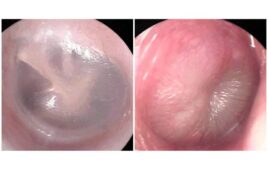
University of Illinois researchers and physicians at Carle Foundation Hospital developed a rapid test for sepsis that counts white blood cells and certain protein markers on their surface to monitor a patient’s immune response. [Image from Janet Sinn-Hanlon/University of Illinois]
Researchers at the University of Illinois and the Carle Foundation Hospital in Urbana, Ill., recently completed a clinical study of the device that provides a fast, point-of-care measurement of the body’s immune system response without having to process blood. The device is designed to help doctors diagnose sepsis at its onset, monitor infected patients and offer a prognosis.
Sepsis happens when immune chemicals released in the body to fight infection end up causing widespread inflammation, blood clots and leaky vessels. It can be caused by other medical conditions like infections in the lungs, urinary tract, skin, abdomen or other parts, according to the National Institute of General Medical Sciences. Invasive medical procedures contribute to sepsis by introducing bacteria into the blood stream.
About 1 million Americans have sepsis per year and 28-50% of those patients die. It also accounts for the most hospital readmissions than any of the other 4 medical conditions (heart attacks, heart failure, COPD and pneumonia) that are tracked by the U.S. government.
“Sepsis is one of the most serious, life-threatening problems in the ICU. It can become deadly quickly, so a bedside test that can monitor patient’s inflammatory status in real time would help us treat it sooner with better accuracy,” said Karen White, an intensive care physician at Carle Foundation Hospital and leader of the clinical side of the study, in a press release.
Sepsis can be detected by monitoring a patient’s vital signs like their blood pressure, oxygen levels and temperature. If doctors detect the patient might have sepsis, their next task is to determine where the infection is coming from using blood cultures and other tests that can typically take a couple of days to return the results.
The new device, however, doesn’t require days to receive a response.
“We are looking at the immune response, rather than focusing on identifying the source of the infection,” said Rashid Bashir, a professor of bioengineering and the university and interim vice dean of the Carle Illinois College of Medicine. “One person’s immune system might respond differently from somebody else’s to the same infection. In some cases, the immune system will respond before the infection is detectable This test can complement bacterial detection and identification. We think we need both approaches: detect the pathogen, but also monitor the immune system.”
The lab-on-a-chip device counts total white blood cells and specific white blood cells called neutrophils. It also measures a protein marker called CD64 on the surface of neutrophils. CD64 levels are known to rise as the immune response increases.
Researchers tested the device using blood samples from Carle patients in the ICU and emergency room. A small drop of blood was tested by researchers when doctors suspected there might be an infection. The research team monitored CD64 levels over time and compared them with vital signs information. The researchers suggest that the rapid test results correlated well with traditional test results and patient vital signs.
“By measuring the CD64 and the white cell counts, we were able to correlate the diagnosis and progress of the patient – whether they were improving or not,” said Uber Hassan, a postdoctoral researcher at the university and the first author of the study. “We hope that this technology will be able to not only diagnose the patient but also provide a prognosis. We have more work to do on that.”
The researchers plan to use measurements from other inflammation markers on the lab-on-a-chip device to help give more of a complete understanding of the body’s response and to detect infection earlier. They also started the startup company Prenosis to commercialize the device.
“We want to move the diagnosis point backward in time,” Bashir said. “The big challenge in sepsis is that no one knows when you get infected. Usually you go to the hospital when you already feel sick. So the goal is that someday you can be testing this at home, to detect infection even earlier if you can.”
The research was supported by the Center for Integration of Medicine and Innovative Technology Innovation in Boston, Carle Foundation Hospital and the University of Illinois. It was published online in the journal Nature Communications.
[Want to stay more on top of MDO content? Subscribe to our weekly e-newsletter.]







